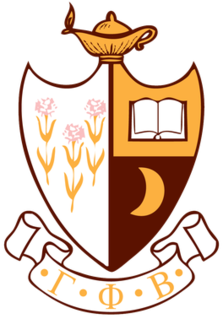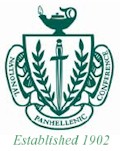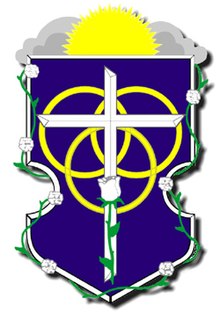Delta Phi Epsilon (ΔΦΕ) may refer to:
- Delta Phi Epsilon (professional), the professional foreign service fraternity and sorority
- Delta Phi Epsilon (social), a National Panhellenic Conference affiliated social sorority
Delta Phi Epsilon (ΔΦΕ) may refer to:

Dartmouth College is host to many Greek organizations, and a significant percentage of the undergraduate student body is active in Greek life. In 2005, the school stated that 1,785 students were members of a fraternity, sorority, or coeducational Greek house, comprising about 43 percent of all students, or about 60 percent of the eligible student body. Greek organizations at Dartmouth provide both social and residential opportunities for students, and are the only single-sex residential option on campus. Greek organizations at Dartmouth do not provide dining options, as regular meals service has been banned in Greek houses since 1909.

Gamma Phi Beta is an international college sorority. It was founded in Syracuse University in 1874, and was the first of the Greek organizations to call itself a sorority. The term "sorority" was coined for Gamma Phi Beta by Dr. Frank Smalley, a professor at Syracuse University.

The National Panhellenic Conference (NPC) is an umbrella organization for 26 (inter)national women's sororities throughout the United States and Canada. Each member group is autonomous as a social, Greek-letter society of college women and alumnae.
Professional fraternities, in the North American fraternity system, are organizations whose primary purpose is to promote the interests of a particular profession and whose membership is restricted to students in that particular field of professional education or study. This may be contrasted with service fraternities and sororities, whose primary purpose is community service, and social fraternities and sororities, whose primary purposes are generally aimed towards some other aspect, such as the development of character, friendship, leadership, or literary ability.

Alpha Phi Delta (ΑΦΔ), commonly referred to as APD, is a Greek social fraternity that evolved from an exclusive Italian society initially known as Il Circolo Italiano at Syracuse University in 1914.
While the traditional social fraternity is a well-established mainstay across the United States at institutions of higher learning, alternatives – in the form of social fraternities that require doctrinal and behavioral conformity to the Christian faith – developed in the early 20th century. They continue to grow in size and popularity.

Delta Phi Epsilon is an international sorority founded on March 17, 1917 at New York University Law School in Manhattan. It is one of 26 social sororities that form the National Panhellenic Conference. It has 109 active chapters, two of which are located in Canada, making the sorority an international organization.
While the traditional women's fraternity or sorority was founded well before the start of the 20th century, the first ever Christian sorority was founded in Kansas in 1916 by and named Kappa Phi. It was a women's sisterhood that developed out of a bible study and remains one of the largest nationally present Christian sororities today.

Alpha Omega Epsilon (ΑΩΕ) is a social and professional sorority for women in engineering and technical sciences. The sorority was founded by twenty-seven female engineering students at Marquette University on November 13, 1983, and four months later on March 22, 1984, it became a recognized organization on the Marquette University campus. The idea of uniting female engineers and technical scientists of all curricula as Alpha Omega Epsilon has spread to other campuses. As a result, there are currently forty-eight active chapters of the sorority. Alpha Omega Epsilon enjoys a close working relationship with its male counterpart, Sigma Phi Delta (ΣΦΔ).
East Carolina University is home to sixteen social fraternities, ten social sororities, five historically African-American fraternities, and four historically African-American sororities. There are also sixteen honor fraternities, and twelve service or religious fraternities/sororities.
The College of William & Mary fraternity and sorority system recognizes chapters of national organizations belonging to the Panhellenic Council, the Interfraternity Council (IFC) and the National Pan-Hellenic Council, and also recognizes one local fraternity without Greek letters and the local chapter of one national fraternity that abandoned membership in an inter-Greek consortium. The school also offers a variety of honor and co-ed service fraternities as well. The first collegiate fraternity within the present borders of the United States, the Latin-letter F.H.C. Society, was founded at the College of William & Mary on November 11, 1750. The new country's first Greek-letter fraternity was founded at the College on December 5, 1776, though the Phi Beta Kappa Society no longer is a social fraternity but, instead, the leading American academic honor society. Some fraternities and sororities are limited to graduate students at William & Mary, while others may only be joined at the undergraduate level. Still other Greek-letter organizations operate without recognition or approval from college administrators.
The expansion of Greek letter organizations into Canada was an important stage of the North American fraternity movement, beginning in 1879 with the establishment of a chapter of Zeta Psi at the University of Toronto. In 1883 the same fraternity established a chapter at McGill University. Other early foundations were Kappa Alpha Society at Toronto in 1892 and at McGill in 1899, and Alpha Delta Phi at Toronto in 1893 and at McGill in 1897. The first sorority, Kappa Alpha Theta, was established at Toronto in 1887. In 1902, the first international chapter of Phi Delta Theta was established at McGill University as the Quebec Alpha. The development of the fraternity system in Canada has made great progress in these two universities. In 1927 Baird's Manual of American College Fraternities reported the existence of 42 chapters at the University of Toronto and of 23 chapters at McGill University. A few chapters were also reported from the University of British Columbia, University of Calgary, Carleton University, Dalhousie University, University of Manitoba, Queen's University, University of Western Ontario, McMaster University, Wilfrid Laurier University, University of Waterloo, Brock University and University of Alberta.

Fraternities and sororities at University of Virginia, include the collegiate organizations on the grounds of the University of Virginia in Charlottesville, Virginia. First founded in the 1850s with the establishment of a number of fraternities, the system has since expanded to include sororities, professional organizations, service fraternities, honor fraternities, and cultural organizations. Fraternities and sororities have been significant to the history of the University of Virginia, including the founding of two national fraternities Kappa Sigma (ΚΣ) and Pi Kappa Alpha (ΠΚΑ).